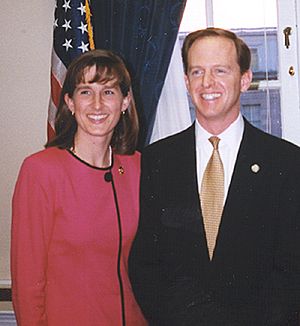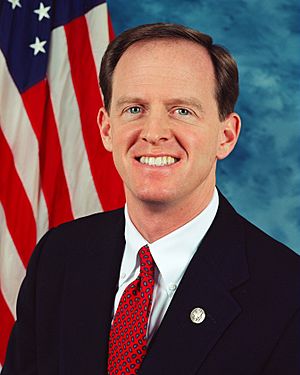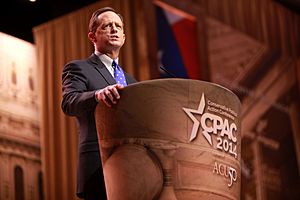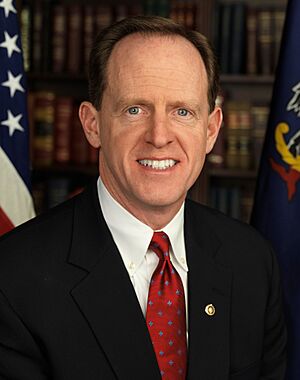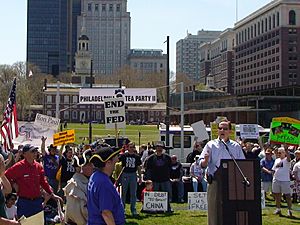Pat Toomey facts for kids
Quick facts for kids
Pat Toomey
|
|
|---|---|
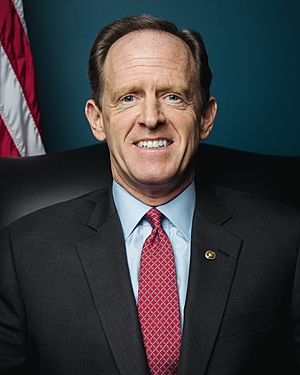
Official portrait, 2018
|
|
| United States Senator from Pennsylvania |
|
| In office January 3, 2011 – January 3, 2023 |
|
| Preceded by | Arlen Specter |
| Succeeded by | John Fetterman |
| Ranking Member of the Senate Banking Committee | |
| In office January 3, 2021 – January 3, 2023 |
|
| Preceded by | Sherrod Brown |
| Succeeded by | Tim Scott |
| Member of the U.S. House of Representatives from Pennsylvania's 15th district |
|
| In office January 3, 1999 – January 3, 2005 |
|
| Preceded by | Paul McHale |
| Succeeded by | Charlie Dent |
| Personal details | |
| Born |
Patrick Joseph Toomey Jr.
November 17, 1961 Providence, Rhode Island, U.S. |
| Political party | Republican |
| Spouse |
Kris Duncan
(m. 1997) |
| Children | 3 |
| Education | Harvard University (BA) |
| Signature |  |
Patrick Joseph Toomey Jr. (born November 17, 1961) is an American businessman and politician. He served as a United States senator for Pennsylvania from 2011 to 2023. Before that, he was a U.S. representative for Pennsylvania's 15th district from 1999 to 2005. He is a member of the Republican Party.
Toomey graduated from Harvard College. He worked as a banker on Wall Street before entering politics. From 2005 to 2009, he was the president of the Club for Growth, a group that supports lower taxes and less government spending. He was first elected to the U.S. Senate in 2010 and was reelected in 2016. In 2020, he announced he would not run for reelection in 2022. After leaving the Senate, Toomey joined the board of a company called Apollo Global Management.
Contents
Early Life and Education
Patrick Joseph Toomey Jr. was born on November 17, 1961, in Providence, Rhode Island. He was the third of six children. His father was of Irish descent, and his mother had Portuguese ancestry from the Azores. His father worked for an electric company, and his mother was a part-time secretary.
Toomey was an Eagle Scout in the Boy Scouts of America. He attended La Salle Academy on a scholarship. He then went to Harvard College, where he earned a degree in government in 1984.
Early Career and Business Ventures
After college, Toomey worked at Chemical Bank and later at Morgan, Grenfell & Co.. He dealt with different foreign currencies and financial products.
In 1991, Toomey left banking and, with his two younger brothers, opened Rookie's Restaurant in Allentown, Pennsylvania.
In 1994, Toomey was elected to Allentown's Government Study Commission. He helped create a new city rule that made it harder to raise taxes. This rule also changed how taxes were collected on land and buildings. Allentown voters approved this new rule in 1996.
Serving in the U.S. House of Representatives
Becoming a Representative
In 1998, Toomey ran for the U.S. House of Representatives in Pennsylvania's 15th district. The current representative, Paul McHale, was retiring. Toomey won the Republican primary election.
In the main election, Toomey ran against state Senator Roy Afflerbach. Toomey criticized the government's plans to change the Internal Revenue Service (IRS), saying it should be abolished. He also debated with Afflerbach about a "flat tax" system, where everyone pays the same tax rate. Toomey promised to serve no more than three terms if elected. He won the election with 55% of the vote.
Reelection and Leaving the House
Toomey was reelected for a second term in 2000 and a third term in 2002. In 2004, he kept his promise not to run for the House again. Instead, he decided to challenge the sitting U.S. Senator, Arlen Specter, in the Republican primary. He lost that election by a small number of votes.
Key Actions in the House
Toomey served in the House from 1999 to 2005. He was known for his knowledge of money matters and pushed to cut government spending.
In 2001, he suggested a budget that would cut taxes by a large amount over ten years. In 2002, he voted to allow military action against Iraq.
Toomey did not support a plan for major immigration reform. He believed it was unfair to people who entered the country legally. He also supported creating Medicare Part D, which helps with prescription drug costs, but only if it lowered costs and encouraged competition. In January 1999, he joined the House Budget Committee.
Serving in the U.S. Senate
Senate Elections
2004 Senate Race
In 2004, Toomey challenged Senator Arlen Specter in the Republican primary. Toomey's campaign argued that Specter was not conservative enough, especially on money issues. Most Republican leaders, including President George W. Bush, supported Specter. Specter won by a very small margin, about 17,000 votes.
2010 Senate Race
In 2009, Toomey announced he would challenge Specter again in the 2010 Republican primary. However, Specter then switched parties and became a Democrat. This left Toomey as the main Republican candidate.
Toomey won the Republican primary easily. In the general election, he faced Joe Sestak, a U.S. Representative. The election was very competitive and expensive. Toomey won with 51% of the vote.
2016 Senate Race
Toomey ran for reelection in 2016. He won the Republican primary without opposition. In the general election, he defeated Democratic candidate Katie McGinty with 48.9% of the vote.
Time in the Senate
Toomey became a U.S. Senator on January 3, 2011. He was the first person from the Lehigh Valley region to serve as a Senator from Pennsylvania in a long time.
In 2011, he was named to the United States Congress Joint Select Committee on Deficit Reduction. This committee worked to find ways to cut government spending. In 2012, he was chosen to lead the United States Senate Steering Committee, a group of Republican senators who work together on laws.
In 2018, Toomey voted to confirm Brett Kavanaugh to the Supreme Court. Some people criticized Toomey for not holding enough in-person meetings with his constituents (the people he represented). He often held "teleconference town-hall meetings" instead.
In 2019, Toomey voted against a bill to prevent a government shutdown that included money for barriers on the U.S.-Mexico border. He also supported a plan to limit the Supreme Court to nine justices.
In 2020, Toomey was appointed to the COVID-19 Congressional Oversight Commission. This group oversaw how the CARES Act, a law to help with the COVID-19 pandemic, was put into action. On October 5, 2020, Toomey announced he would retire at the end of his term in 2022.
Committee Assignments:
- Committee on Banking, Housing, and Urban Affairs
- Committee on the Budget
- Committee on Finance
- Joint Economic Committee
Political Views and Stances
Education
Toomey strongly supported giving more public money to charter schools. In 2017, he supported Betsy DeVos as President Trump's choice for Secretary of Education.
Environment
Toomey has stated that he believes climate change is happening, but he is not as sure about how much human activity causes it. He has often voted against environmental interests. For example, he voted to limit the Environmental Protection Agency's power to control greenhouse gas emissions. He also voted against the Clean Power Plan.
Government Spending and Taxes
Toomey supports replacing the current tax system with a "flat tax," where everyone pays the same percentage of their income. He also favors getting rid of the IRS and cutting various taxes.
He opposed the 2009 federal stimulus package, which was meant to boost the economy. He also opposes government-run healthcare and farm subsidies. In 2011, Toomey supported a federal rule that would require a balanced budget.
Gun Policy
After the Sandy Hook Elementary School shooting in 2013, Toomey and Senator Joe Manchin proposed a law that would require background checks for most gun sales. This law did not pass. He continued to support background checks after other mass shootings.
In 2022, Toomey was part of a group of senators who worked on a "modest" gun control deal. This deal included stronger background checks for young buyers and funding for school safety. He voted for this bill, called the Bipartisan Safer Communities Act.
LGBT Rights
In 2004, Toomey said he believed marriage should be defined as "one man, one woman." He voted for a change to the U.S. Constitution to ban same-sex marriage. In 2015, he disagreed with the Supreme Court's decision that made same-sex marriage legal across the country.
However, in 2010, Toomey supported ending "Don't ask, don't tell," a policy that prevented openly gay or bisexual people from serving in the military. In 2013, he voted for a law to prevent job discrimination based on sexual orientation, but he wanted to add protections for religious groups.
Healthcare
Toomey opposed the Medicare Prescription Drug, Improvement, and Modernization Act, saying it was too expensive. He also opposed the Patient Protection and Affordable Care Act (Obamacare) and supported efforts to get rid of it.
In 2017, Toomey helped write a Republican bill to repeal Obamacare. In 2022, he voted against a plan to limit insulin costs to $35 per month.
Immigration
Toomey supported President Trump's 2017 order that banned people from seven Muslim-majority countries from entering the U.S. In 2019, he voted against a bill that included money for barriers on the U.S.-Mexico border. He also voted to block Trump's declaration of a national emergency to build border barriers.
Impeachment of Donald Trump
In December 2019, Toomey said that President Trump's actions regarding Ukraine were "errors of judgment" but not serious enough for impeachment. He voted against convicting Trump in his first impeachment trial.
However, after the January 6 United States Capitol attack in 2021, Toomey said he believed Trump had committed an impeachable offense. In Trump's second impeachment trial, Toomey was one of seven Republican senators who voted to convict Donald Trump.
Foreign Policy
In 2016, Toomey signed a letter asking the U.S. to stop Russia's airstrikes in Syria. In 2017, he supported a bill that would make it a crime for Americans to encourage boycotts against Israel.
In 2018, Toomey voted against a plan that would have required Trump to withdraw American troops from Yemen. He also expressed concern about North Korea avoiding international sanctions with help from Russia and China. In 2020, Toomey was among several U.S. officials who were sanctioned by the Chinese government for their views on Hong Kong.
Trade
In 2018, Toomey signed letters asking President Trump to keep and update the North American Free Trade Agreement (NAFTA). He also urged Trump to submit the new United States-Mexico-Canada Agreement (USMCA) to Congress quickly.
Veterans
In 2022, Toomey was one of 11 Senators who voted against the Honoring our PACT Act of 2022. This bill would have provided funding for research and benefits for veterans exposed to toxic substances during their service.
Personal Life
In November 1997, Pat Toomey married Kris Ann Duncan. They have three children. After leaving the Senate in 2023, Toomey joined the board of Apollo Global Management, a large investment company.
Electoral History
| Year | Democratic | Votes | Pct | Republican | Votes | Pct | ||
|---|---|---|---|---|---|---|---|---|
| 1998 | Roy Afflerbach | 66,930 | 45% | Patrick J. Toomey | 81,755 | 55% | ||
| 2000 | Edward O'Brien | 103,864 | 47% | Patrick J. Toomey (incumbent) | 118,307 | 53% | ||
| 2002 | Edward O'Brien | 73,212 | 43% | Patrick J. Toomey (incumbent) | 98,493 | 57% |
| 2004 United States Senate Republican primary election in Pennsylvania | |||||
|---|---|---|---|---|---|
| Party | Candidate | Votes | % | ±% | |
| Republican | Arlen Specter (incumbent) | 530,839 | 50.82 | ||
| Republican | Pat Toomey | 513,693 | 49.18 | ||
| 2010 United States Senate Republican primary election in Pennsylvania | |||||
|---|---|---|---|---|---|
| Party | Candidate | Votes | % | ±% | |
| Republican | Pat Toomey | 667,614 | 81.5 | ||
| Republican | Peg Luksik | 151,901 | 18.5 | ||
| 2010 United States Senate election in Pennsylvania | |||||
|---|---|---|---|---|---|
| Party | Candidate | Votes | % | ±% | |
| Republican | Pat Toomey | 2,028,945 | 51.01% | −1.61% | |
| Democratic | Joe Sestak | 1,948,716 | 48.99% | +7.00% | |
| Majority | 80,229 | 2.02% | |||
| Total votes | 3,977,661 | 100.0 | |||
| Republican gain from Democrat | Swing | ||||
| 2016 United States Senate election in Pennsylvania | |||||
|---|---|---|---|---|---|
| Party | Candidate | Votes | % | ±% | |
| Republican | Pat Toomey (inc.) | 2,951,702 | 48.77% | −2.24% | |
| Democratic | Katie McGinty | 2,865,012 | 47.34% | −1.65% | |
| Libertarian | Edward T. Clifford III | 235,142 | 3.89% | N/A | |
| Total votes | 6,051,941 | 100.00% | |||
| Republican hold | Swing | NA | |||
See also
 In Spanish: Pat Toomey para niños
In Spanish: Pat Toomey para niños


